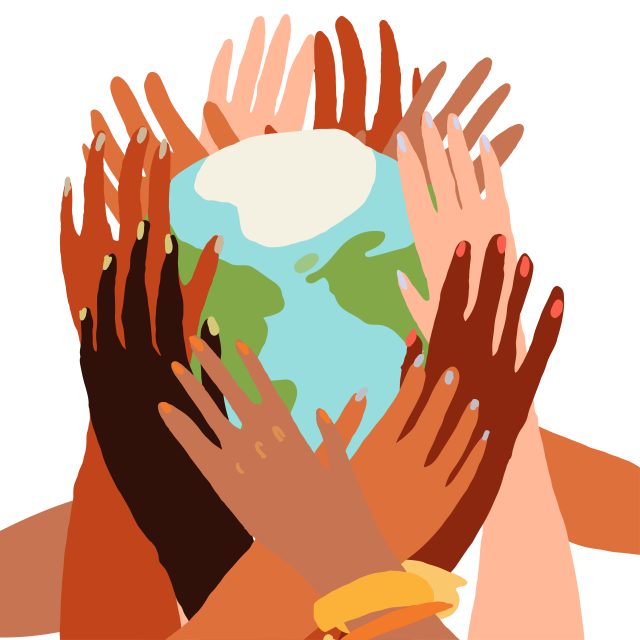
At Foundations for Leaders Organizing for Water and Sustainability (FLOWS), we center, elevate and celebrate the knowledge of underinvested and disproportionately impacted communities in the City of Boulder and CU Boulder students in environmental and climate justice work. We are a diverse group of Black, Indigenous and People of Color (BIPOC) from all over the world including Mexico, Venezuela, Colombia, Costa Rica, Nepal and South Sudan. At the Right Here, Right Now Climate Summit hosted by CU Boulder and the United Nations this past December, representation of and by impacted communities was a continuous theme. We expand on representation and why BIPOC leadership is crucial to climate initiatives and solutions.
We start by honoring and showing gratitude to the Hinono’eino (Arapaho), Núu-agha-tʉvʉ-pʉ̱ (Ute) and all original inhabitants and their descendants of this valley and Turtle Island. We recognize that the violent removal and genocide of these original stewards has also attempted to erase Indigenous and Earth-based values, knowledge, and practices in environmental and community stewardship that are so critical to addressing climate chaos.
Systemic racism, violence and oppression are tools of white dominance and supremacy to exclude and silence the most impacted communities both locally and globally from decision-making processes in climate initiatives. FLOWS member Adriana Palacios describes this as “epistemic violence that prevails over practices, stories, and knowledge that when perceived as different, as subaltern, as dominated, are denied, silenced and made invisible throughout history.” Additionally, people who are not from our communities wrongfully speak, represent and make decisions without our consent on issues that have tremendous impact on our bodies, health, water sources, homes, communities and environments. At FLOWS, we know our communities are the experts of their needs and must lead in decisions that concern them.
“Racism has clouded the mainstream portions of environmental and climate movements from recognizing solutions that are right there from communities dealing with and navigating the direct impacts of environmental degradation,” explains FLOWS founder Michelle Gabrieloff-Parish. In celebration of Black History Month, she emphasizes the importance of paying proper respects to Black leaders such as George Washington Carver, the grandfather of what is now being called “regenerative agriculture” and Martin Luther King Jr., who was organizing sanitation workers (a key sustainability issue) at the time of his assassination.
FLOWS member Ingrid Castro-Campos mentions the importance that we are not diversity tokens or a check in a box for climate justice organizations in diversity, equity and inclusion efforts. She adds that “spaces are often biased and unsafe … led in the majority of cases by well intentioned individuals … and yet … the systems from which they operate from are deeply influenced by the same issues that bring us to the space.”
FLOWS Assistant Coordinator Gabriela Galindo shares a similar sentiment: “Colonialism and capitalism hurt us all, including those who impose it. These unbalanced and artificial systems treat everything, everyone and environments as things to be owned, sold, exploited and endlessly extracted from. Effective and holistic solutions will come from Indigenous, community led and Earth-based cultures who hold timeless knowledge of a balanced way of living.”
We seek meaningful involvement and for our leadership to be respected and resourced. FLOWS team member Alejandro Murillo offers calls to action: “We ask for investment in people, organizations and grassroots efforts that do not conform to the dominant narratives and systems. We ask that people raise their voices in planning and budgetary meetings to allocate support and funds for underrepresented people and organizations. We ask people who are currently in positions of power to engage in their own deep personal work around their privilege and how they’ve benefited from it. Do you open doors for people who are the change or do you stand in the way?”
FLOWS also strives for economic justice and believes that our communities expertise and time need to be properly compensated. FLOWS Program Coordinator Rinchen Indya Love shares how removing barriers can help with participation for underinvested community members. This looks like “creating a stipend mentorship program with interpretation access,childcare and high quality food.” FLOWS not only works to gain access to these rights that every family should have, but also attempts to make it accessible.
As Winona LaDuke says, “This is a time of truth telling.” A time to acknowledge and accept the harm committed upon Black, Indigenous and People of Color by the violent imposition of European human centric values, systems and infrastructures. Governments, police, legal systems, political systems, oil and gas monoliths, academia, science, pharmacology and technology fields uphold, participate and protect themselves in the destruction of people and environments. It’s time to reconcile that these are not the measures of successful and “civilized” nations. It’s time for leaders who know a better way. Will racism be what prevents us from finding the collective solutions we all need to unite on?
We at FLOWS celebrate the inherent knowledge of our communities. Our upbringings and connections to our homelands and cultures offer us a richness in perspectives and experiences. We give gratitude to our ancestors and all those who have dedicated themselves to protecting and respecting waters, air, soil, plants, foods and ecosystems for all life. We walk in the footsteps of our ancestors, grandparents and mentors and continue creating pathways for our BlPOC kin and underrepresented communities. Our presence is “resiliencia (resilience) and resistancia (resistance),” as Castro-Campos puts it, until the days when defending the very sources and sustenance of life aren’t tremendous acts of courage or uphill battles but gifts and joyful responsibilities in which we all collectively participate.
The Foundations for Leaders Organizing for Water and Sustainability (FLOWS) Program housed at the CU Boulder Environmental Center brings attention to the leadership of underrepresented and underinvested voices in the sustainability and environmental and climate justice world. We partner with the City of Boulder and Boulder Housing Partners.
This opinion column does not necessarily reflect the views of Boulder Weekly.














